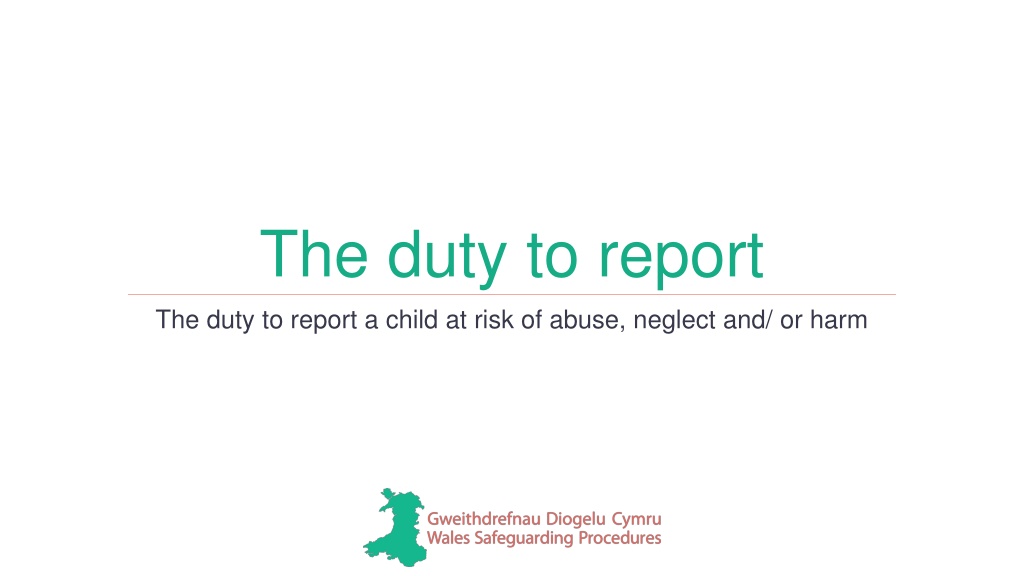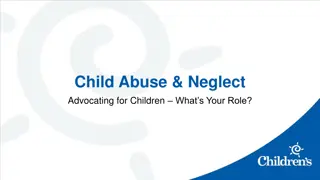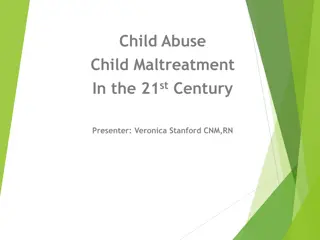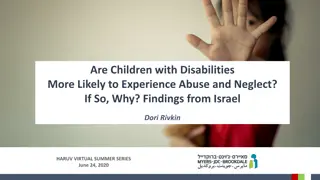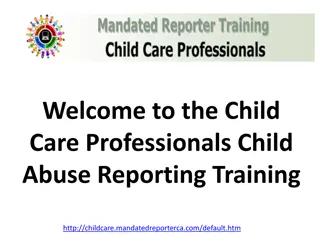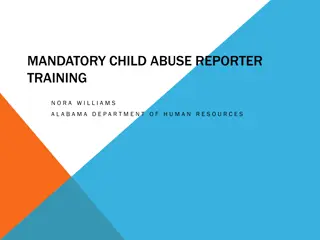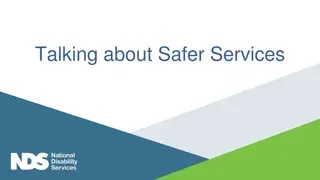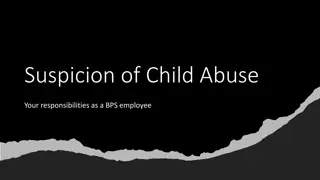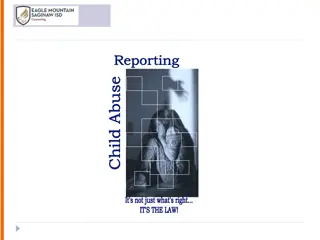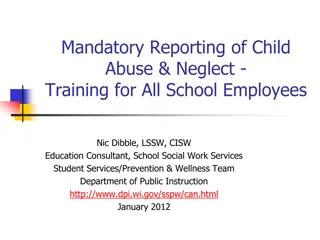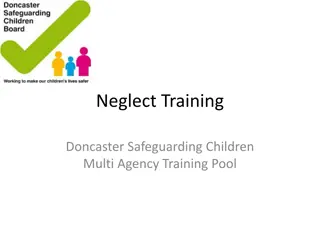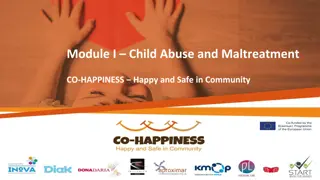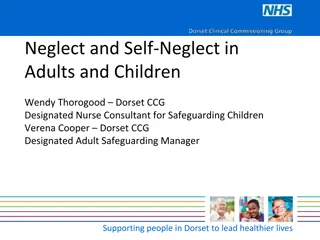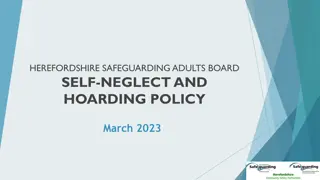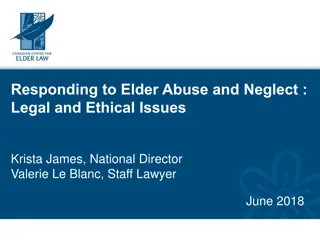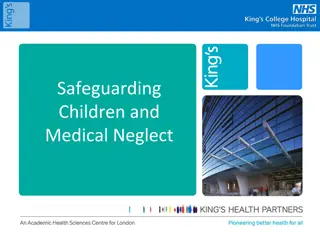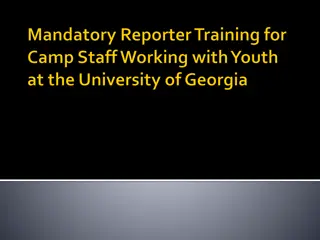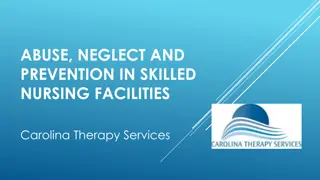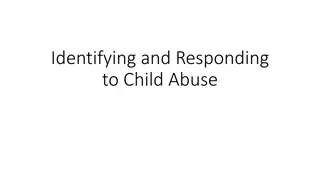Understanding the Duty to Report Child Abuse and Neglect
The duty to report concerns of child abuse, neglect, and harm is essential for practitioners and individuals coming into contact with children. This responsibility, whether statutory or non-statutory, requires prompt action to safeguard children at risk. Recognizing and acting on suspicions of abuse can prevent further harm and ensure the well-being of children in need of protection.
Download Presentation

Please find below an Image/Link to download the presentation.
The content on the website is provided AS IS for your information and personal use only. It may not be sold, licensed, or shared on other websites without obtaining consent from the author. Download presentation by click this link. If you encounter any issues during the download, it is possible that the publisher has removed the file from their server.
E N D
Presentation Transcript
The duty to report The duty to report a child at risk of abuse, neglect and/ or harm
Practitioner Practitioner describes anyone who comes into contact with children through paid or voluntary work They may also be people with caring responsibilities for children in need of care and support
Report A duty to report replaces the older term make a referral to social services Previously: Make a referral Now: Make a report
Concern There may not always be evidence of abuse, neglect or harm Practitioners may only suspect (rather than know)a child is experiencing or at risk of abuse This may be based on: information from different sources over time professional judgement seemingly insignificant information that may be part of a bigger picture These situations, where there is no clear factual evidence, are referred to as concerns
Who has a responsibility to report? We all do! You have a responsibility to contactsocial services or the police if you know or have concerns or suspicions that a child: is experiencing abuse, neglect or other kinds of harm has experienced abuse, neglect or other kinds of harm is likely to be at risk of abuse, neglect or other kinds of harm This is not a matter of personal choice
Statutory duty to report Statutorymeans it s required by law The Social Services and Well-being (Wales) Act 2014 says relevant partners of the local authority (including the police, education, local health boards and NHS trusts) have a statutory (legal) responsibility to report if they have reasonable cause to suspect adults and children, including unborn children, are at risk of abuse
Non-statutory responsibility to report Anyone who is not a relevant partner must still report any safeguarding concerns they have in the same way as those with a statutory duty to report Safeguarding is everyone s responsibility!
Duty to report concerns about a practitioner It is important that practitioners do not ignore or dismiss suspicions about another practitioner or colleague who may be abusing, neglecting or causing harm to a child at risk Every practitioner has a responsibility to safeguard children and that includes protection from abuse by another practitioner This includes in their private life. If any practitioner becomes aware of concerning behaviour of a friend, family member or neighbour, who is also a practitioner, they must report their concerns
Reporting concerns Practitioners are expected to make a report to the social services department where the safeguarding concern is thought to have occurred This may mean reporting to a local authority that: is not where the practitioner works is not where the child or adult at risk lives Unsure which local authority to report to? Contact your local social services for advice
Who to contact outside office hours Local authorities must be able to receive concerns 24 hours a day, seven days a week The Emergency Duty Team (out of hours team) receives concerns from other agencies, practitioners and members of the public about a child at risk of harm outside normal working hours Important: If you can t contact a member of the Emergency Duty Team and there is an immediate concern, call 999 for the police without delay
Immediate concerns The safety of the child always comes first Practitioners should always consider whether there are immediate concerns about the safety of a child, including an unborn child If there are immediate concerns, you must contact the emergency services without delay to protect the child/children from the risk of serious harm
Immediate concerns You have an immediate concern if you believe: the child is in imminent danger call 999 for the police without delay they need urgent medical attention call 999 for an ambulance without delay other children or adults may also be in imminent danger call 999 for the police without delay someone has committed a crime against a child call 999 for the police without delay
Concerns about an unborn child In Wales there is currently limited legal recognition of unborn babies. A woman has the right to refuse to engage with social services and health while pregnant Nevertheless, it is important that you report any concerns about an unborn baby, or the parents ability to cope with a newborn, as soon as they come to your attention
Seeking advice If you are hesitant or unsure about whether a child is at risk of harm youshould seek advice do not wait for further evidence to confirm or refute your concerns, no matter how insignificant you think they are do seek advice straight away from your agency s designated safeguarding person (DSP) who: will know whether to raise a safeguarding concern with the local authority will manage any immediate actions to ensure the individual at risk is safe from abuse
Advice from social services If your DSP is not available, or you still don t know whether to report concerns, you should discuss them with social services, who will advise you what to do next It is important to recognise that: seeking advice does not mean you ve made a report youare responsible for making a report you must clearly tell them if you want to make a report telling social services about your concerns does not mean you have made a report
Advice from social services You should contact social services directly if: someone would be at risk by the delay if you contacted the DSP first the DSP hasn t taken action and you are still concerned about the child your concern is about or involves the DSP and you have no other manager to contact
